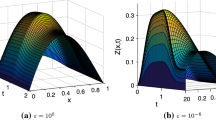We consider the numerical solution of a initial boundary value problem with a time delay. The problem under consideration is singularly perturbed from the mathematical perspective. Assuming that the coefficients of the differential equation are smooth, we construct and analyze the finite difference method whose solutions converge pointwise at all points of the domain independently of the singular perturbation parameter. The method permits its extension to the case of adaptive meshes, which may be used to improve the solution. Numerical examples are presented to demonstrate the effectiveness of the method. The convergence obtained in practice satisfies the theoretical predictions.
Similar content being viewed by others
References
H. Han and R. B. Kellogg, “Differentiability properties of solutions of the equation − ϵΔu + ru = f(x, y) in a square,” SIAM J. Math. Anal., 21, 394–408 (1990).
A. Friedman, Partial Differential Equation of Parabolic Type, Prentice-Hall Englewood Cliffs (1964).
A. Asachenkov, G. Marchuk, R. Mohler, and S. Zuev, Disease Dynamics, Birkhäuser, Boston (1994).
A. Kaushik, “Singular perturbation analysis of bistable differential equation arising in the nerve pulse propagation,” Nonlin. Anal. Real World Appl., 9, 2106–2127 (2008).
A. Kaushik, “Pointwise uniformly convergent numerical treatment for the nonstationary Burger Huxley equation using grid equidistribution,” Int. J. Comput. Math., 84, No. 10, 1527–1546 (2007).
A. Kaushik, “Nonstandard perturbation approximation and travelling wave solutions of non-linear reaction diffusion equations,” Numerical Methods for Partial Differential Equations, 24, No. 1, 217–238 (2008).
A. Kaushik and M. D. Sharma, “Numerical analysis of a mathematical model for propagation of an electrical pulse in a neuron,” Numerical Methods for Partial Differential Equations, 27, 1–18 (2008).
A. Kaushik, K. K. Sharma, and Manju Sharma, “A parameter uniform difference scheme for parabolic partial differential equation with a retarded argument,” Appl. Math. Model., 34, 4232– 4242 (2010).
W. Eckhaus, Matched Asymptotic Expansions and Singular Perturbations, North-Holland, Amsterdam (1973).
W. Eckhaus, Asymptotic Analysis of Singular Perturbations, North-Holland, Amsterdam (1979).
A. M. Il’in, Matching of Asymptotic Expansions of Solutions of Boundary Value Problems, American Math. Society Translations, Providence.
A. H. Nayfeh, Perturbation Methods, John Wiley, New York (1973).
D. R. Smith, “The Multivariable method in singular perturbation analysis,” SIAM Rev., 17, 221–273 (1975).
M. H. Protter and H. F. Weinberger, Maximum Principles in Differential Equations, Springer (1984).
R. P. Sperb, Maximal Principles and Their Applications, Academic Press, New York (1981).
N. K. Nichols, “On the numerical integration of a class of singular perturbation problems,” J. Optim. Theory Appl., 60, 439–452 (1989).
M. K. Kadalbajoo and Y. N. Reddy, “A nonasymptotic method for general singular perturbation problems,” J. Optim. Theory Appl., 55, 256–269 (1986).
Author information
Authors and Affiliations
Corresponding author
Rights and permissions
About this article
Cite this article
Kaushik, A., Sharma, M. A Robust numerical approach for singularly perturbed time delayed parabolic partial differential equations. Comput Math Model 23, 96–106 (2012). https://doi.org/10.1007/s10598-012-9122-5
Published:
Issue Date:
DOI: https://doi.org/10.1007/s10598-012-9122-5




